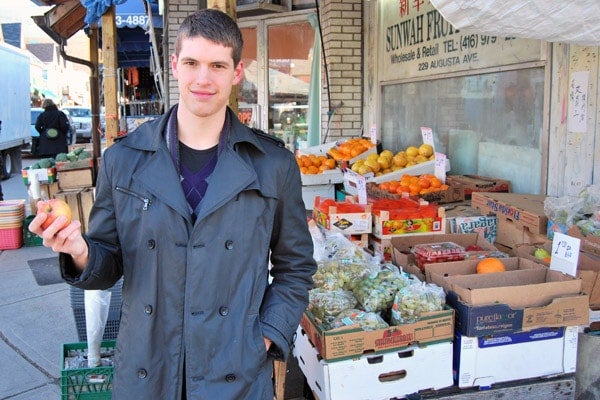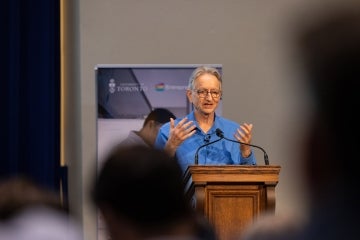
Healthy neighbourhoods lead to healthy nations, says visiting Fulbright scholar
Published: February 10, 2012
To an urban planner, Toronto’s Kensington Market is a vibrant, multi-use neighbourhood. To a nutritionist, it’s a bountiful source of fresh fruits and vegetables. For a physical activity enthusiast, it proves that walking can be a primary source of transportation. For visiting researcher and market resident Ryan Lange, his neighbourhood exemplifies how wise planning and policies – ones that resonate with the population – can promote health and, more specifically, help ward off obesity.
Lange is studying at the University of Toronto’s Faculty of Kinesiology and Physical Education on a prestigious Fulbright scholarship after earning his undergraduate degree at Northwestern University.
“I have a background in hard science,” he said. “I know a lot about the chemistry and biology of obesity and am now more interested in the human component, which is almost infinitely more complex.”
Lange looked to Canada for insight, intrigued that despite our similar culture and lifestyle, obesity rates are lower here than there are in the U.S. (an average of one in three, versus one in six). He chose U of T because of its many experts, including his supervisor, Professor Guy Faulkner, and the institution’s multidisciplinary approach.
“U of T is a beacon of research and I want a very well-rounded, three dimensional picture of this problem,” Lange explained, noting connections he’s also made with the Dalla Lana School of Public Health and the Department of Nutritional Sciences.
Under Faulkner’s mentorship, Lange’s independent project explores the links between policy on, and public opinion surrounding, obesity. Part of this work involves talking to University of Toronto students about where they lay blame for climbing obesity rates: the food industry, the individual, genes and/or personality flaws. Lange hopes this data will provide insight on what policy and planning approaches will resonate most with tomorrow’s leaders here and at home.
At the end of this term, Lange will return to the U.S. for medical school, but would like to eventually join the decision-makers who influence U.S. health-related policy, which he hopes will soon emulate some initiatives currently in place in Canada. He sees value, for example, in our federal government’s Children's Fitness Tax Credit and potential in agricultural grants to non-corn producers.
Lange also praises Toronto’s car-free zones, food policy council and food share program.
“I’d like to see more programs like this in the United States,” he said. “ We should live in an environment that promotes the healthy choice first. And creating informed policy is one way of doing that.”



